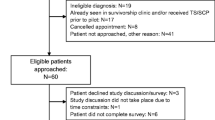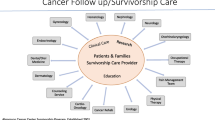Abstract
Purpose
The National Cancer Institute has supported cancer survivorship science for many years, yet few funded studies have examined the needs of individuals living with cancer that is advanced or has metastasized. This report analyzes currently active National Institutes of Health (NIH) grants focused on survivorship for patients living with advanced or metastatic cancers to identify emerging research topics in this population and gaps in current science.
Methods
A search of all NIH research grants that received funding in Fiscal Year 2020 focused on this population was conducted, excluding grants with a primary focus on end-of-life care, tumor progression or staging and grants for which the only outcome was survival.
Results
A total of 25 active grants met the inclusion criteria. Most were funded using the R01 grant mechanism and included a range of cancer types and topics such as palliative/supportive care, psychosocial support, health services, and symptom sequelae.
Conclusions
Although currently funded grants focus on several important topics, gaps in the portfolio remain. There is a need to enhance the grant portfolio of research studies focused on the longitudinal examination of unmet needs, models of care delivery, impact of innovative therapies, and the impact of financial hardship for individuals living with advanced or metastatic cancer.
Implications for Cancer Survivors
This review of current NIH studies suggests a need for expanded research on individuals living with advanced or metastatic cancer. Moving forward, enhancing research focused on key gap areas will be critical to improve care and outcomes for this growing population.

Similar content being viewed by others
References
Miller KD, et al. Cancer treatment and survivorship statistics, 2019. CA Cancer J Clin. 2019. https://pubmed.ncbi.nlm.nih.gov/31184787/.
Moghaddam N, Coxon H, Nabarro S, Hardy B, Cox K. Unmet care needs in people living with advanced cancer: a systematic review. Support Care Cancer. 2016;24:3609–22.
Singer A, et al. Populations and interventions for palliative and end-of-life care: a systematic review. J Palliat Med. 2016;19:995–1011.
Norton W, Kennedy A, Chambers D. Studying de-implementation in health: an analysis of funded research grants. Implement Sci. 2017;12:1–13.
Rowland JH, et al. Survivorship science at the NIH: Lessons learned from grants funded in Fiscal Year 2016. J Natl Cancer Inst. 2018; (in press). https://pubmed.ncbi.nlm.nih.gov/30657942.
Ferrell B, et al. Integration of palliative care into standard oncology care: American Society of Clinical Oncology clinical practice guideline update. J Clin Oncol. 2016. https://pubmed.ncbi.nlm.nih.gov/28034065/.
Chawla N, Yabroff KR, Mariotto A, McNeel TS, Schrag D, Warren JL. Limited validity of diagnosis codes in Medicare claims for identifying cancer metastases and inferring stage. Ann Epidemiol. 2014;24:666–72.
Ling A, Kurian AW, Caswell-Jin JL, Sledge GW Jr, Shah NH, Tamang SR. Using natural language processing to construct a metastatic breast cancer cohort from linked cancer registry and electronic medical records data. JAMIA Open. 2019;2(4):528–37.
Wang T, et al. Unmet care needs of advanced cancer patients and their informal caregivers: A systematic review. BMC Palliat Care. 2018;17(96):1–29.
National Cancer Institute. Optimizing the management and outcomes for cancer survivors transitioning to follow-up care. 2020 [cited 2020 October 21]; Available from: https://cancercontrol.cancer.gov/research-emphasis/contribution-to-the-cancer-moonshot/optimizing-management-outcomes.
Author information
Authors and Affiliations
Contributions
All authors contributed to the study conception and design. Material preparation, data collection and analysis were performed by all authors. The first draft of the manuscript was written by MM, and all authors commented on previous versions of the manuscript. All authors read and approved the final manuscript.
Corresponding author
Ethics declarations
Disclaimers
The article was prepared as part of the authors’ (MAM, GT, ET, PJ, AWS, LG) official duties as employees of the US Federal Government. The findings and conclusions in this report are those of the authors and do not necessarily represent the official position of the National Cancer Institute.
This study has not been previously presented.
Conflict of interest
The authors declare no conflict of interest.
Additional information
Publisher’s note
Springer Nature remains neutral with regard to jurisdictional claims in published maps and institutional affiliations.
Rights and permissions
About this article
Cite this article
Mollica, M.A., Tesauro, G., Tonorezos, E.S. et al. Current state of funded National Institutes of Health grants focused on individuals living with advanced and metastatic cancers: a portfolio analysis. J Cancer Surviv 15, 370–374 (2021). https://doi.org/10.1007/s11764-021-01008-8
Received:
Accepted:
Published:
Issue Date:
DOI: https://doi.org/10.1007/s11764-021-01008-8




